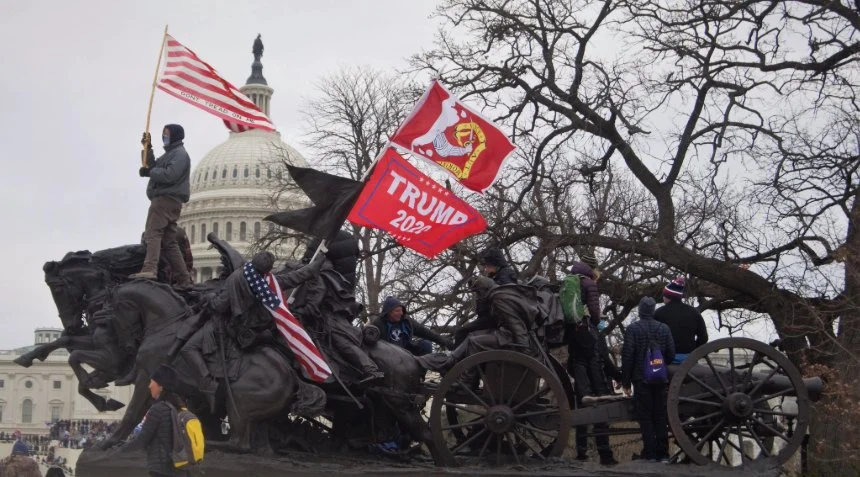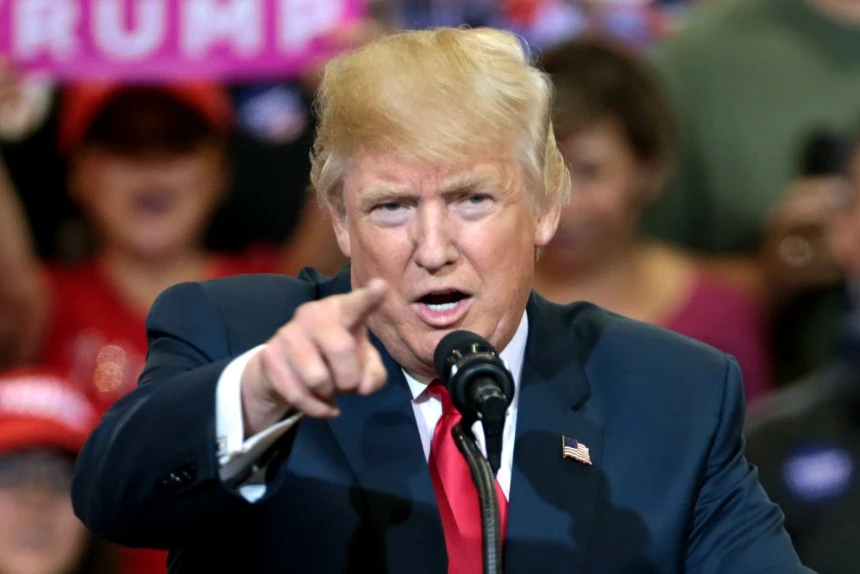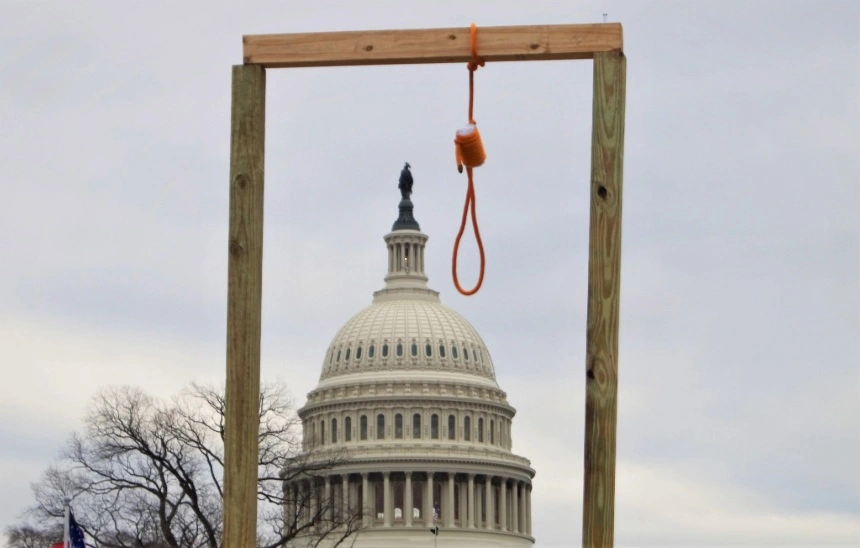In her dissent to ‘Trump v United States,’ Justice Brown Jackson writes “a five-alarm fire threatens to consume democratic self-governance.” That fire burns worldwide. The fire is gaining ground. According to Freedom House’s most recent “Freedom in the World” Report, political rights and civil liberties declined for the eighteenth consecutive year in 2023. 2024 seems unlikely to be a turning point for democracy, raising questions about what can be done to better defend democracy.
- Legal Revolutionary Methods: Democracy’s Internal Threat
- Militant Democracy: Strengthening Constitutional Defences
- The Paradox of Democracy’s Self-Defence
- Identifying Essential Constitutional Norms for Democracy
- Defending Constitutional Essentials
- Building Confidence in Militant Democracy
- Addressing the Limits of Militant Democracy
- Conclusion: Militant Democracy Today
The most significant threat facing democracy today comes from within, as antidemocrats increasingly exploit legal revolutionary methods to undermine democratic institutions. Measures of militant democracy, particularly constitutional unamendability and political disqualification, offer a robust defence against these internal threats.
Can a democracy can defend itself against internal enemies while remaining true to its democratic identity?
This article explores how militant democracy can preserve democratic values while effectively countering internal erosion. I analyze this topic in greater depth in my book Democracy Despite Itself: Liberal Constitutionalism and Militant Democracy.
Legal Revolutionary Methods: Democracy’s Internal Threat
Since the end of the Cold War, antidemocrats have increasingly turned to legal revolutionary methods. Over the last 25 years, 80% of democratic backsliding has occurred internally through legal democratic means. Democracy now cannibalizes itself. This unfolds in two broad stages.
“Illiberal democracy” is no democracy at all.
First, antidemocrats pursue public office through free and fair elections. When they win, it is because their platform is genuinely popular. Voters either fully embrace antidemocratic values or are willing to jettison democratic values to advance their narrow partisan interests.
Second, once in power, antidemocrats use formally valid legal procedures to alter democratic essentials, including the constitution. Unlike fascists and other past antidemocrats, today’s antidemocrats pursue so-called “illiberal democracy.” They tend to leave electoral procedures and members’ political rights mostly intact. They instead roll back liberal constitutional essentials.

Antidemocrats today may weaken the separation of powers, particularly by undermining institutional checks on executive authority and installing loyalists to head key government agencies. They may weaponize institutions, such as the public prosecutor, in order to consolidate their power. They may undermine the rule of law, particularly equality before the law. They may compromise individual human rights and civil liberties, such as press and academic freedoms. In doing so, they leave behind a hollow shell of democracy. “Illiberal democracy” is no democracy at all.
The continuing erosion of democracy through legal revolution raises the following question: can a democracy can defend itself against internal enemies while remaining true to its democratic identity?
Militant Democracy: Strengthening Constitutional Defences
A “militant democracy” adopts strong measures of constitutional entrenchment to defend itself against antidemocratic actors who seek to revolutionize it through legal democratic means. These measures can include constitutional unamendability, political disqualification, and granting the constitutional court final authority over constitutionality. Such measures ensure that democratic constitutional essentials remain valid law and deny antidemocrats access to public power in the first place, minimizing their ability to engage in abusive constitutionalism.
The US Supreme Court’s decisions removed vital institutional backstops for American democracy’s self-defence.
Militant democracy matured as a constitutional form after the Second World War, as jurists responded to the rise of totalitarianism. The German Basic Law exemplifies that constitutional form today.
Some prewar democracies have mechanisms to defend themselves against internal enemies, however. For example, the United States has institutional backstops to protect its democratic integrity. They include measures to disqualify internal enemies from pursuing public office in the first place and measures to hold elected officials accountable for criminal abuses of power. Legislators have thus long recognized the need to defend democracy against those who would turn democracy against itself.
The Paradox of Democracy’s Self-Defence
While measures of militant democracy can address legal revolution, there are reasonable concerns about their compatibility with democratic values. Scholars, politicians, and citizens worry that these measures may harm democracy as much as the forces they aim to stop. They worry militant democracy is illegitimate.

There is something to this concern. At first glance, it does not seem very democratic to tell voters that they can choose whatever law or candidate they want – except their preferred ones. Yet this is the potential consequence of unamendability and political disqualification. There thus seems to be a tension between militant democracy’s aim of defending democracy and its means. This has been called “the paradox of democracy’s self-defence.”
The task of a normative theory of militant democracy is to show how militant democracy is consistent with the essence of democracy.
There are practical consequences to that worry. It may have influenced recent US Supreme Court decisions on Trump’s trials, where the Court ruled that Trump should remain on the ballot despite his role in instigating January 6 and granting him broad immunity for “official acts,” all while slow-walking time-sensitive decisions. A charitable reading of these decisions is that the conservative majority believes public authorities should not shape democratic elections. Accordingly, they worked to ensure that American voters alone have the final say on the next President.
Of course, forgoing measures like disqualification and prosecution for criminal acts may passively allow antidemocrats to cannibalize democracy using legal revolutionary methods, recreating the very conditions that inspired militant democracy in the first place. The core of the above paradox means that democracy is degraded no matter what.
The US Supreme Court’s decisions removed vital institutional backstops for American democracy’s self-defence. They guarantee that a vindictive illiberal insurrectionist remains a favoured candidate to win the 2024 election.
Identifying Essential Constitutional Norms for Democracy
Ultimately, moving beyond the above paradox requires reconciling the normative essence of democracy with the practical necessity of its self-defence. The task of a normative theory of militant democracy is to show how militant democracy is consistent with the essence of democracy.
A first step in developing the normative theory of militant democracy involves identifying whether there are constitutional norms so integral to democracy that no constitution can be considered democratic without them.
Political rights, such as the right to vote and run for public office, are obviously essential to democracy. They guarantee that everyone has an equal chance to see their preferred candidate take office and their interests become public law.
The abrogation of political rights is not the main cause of democratic backsliding today. Populist illiberalism is. This raises the question: is liberal constitutionalism – basic liberal rights and the separation of powers – as essential to constitutional democracy as political rights? Furthermore, should liberal constitutionalism take normative priority over the will of voters who would use political rights and majoritarian procedures against it?
John Rawls, one of the most important political philosophers of the twentieth century, compelling argues that basic liberal rights must be “taken off the political agenda” entirely. Liberal constitutionalism is the essence of democracy. Without basic liberal rights, Rawls shows, a constitution cannot be democratic. Democracy is thus more than merely political rights and value-neutral procedures, which would allow a majority or even supermajority to impose its will using public law. Democracy rests on substantive values.
While Rawls develops this argument most systematically, he is not unique in making this claim. No sensible conception of democracy today exists without liberal constitutionalism. There is broad agreement – even among civic republicans, radical democrats, and proceduralists – that a democracy must guarantee basic liberal rights, human rights, to all members. Otherwise it is no democracy.
Defending Constitutional Essentials
The second step in developing the normative theory of militant democracy involves determining whether a state may proactively defend those constitutional essentials against actors who inimically oppose them and seek their elimination.

Carl Schmitt recognized that modern mass democracy made a state particularly vulnerable to enemies who weaponize value-neutral democratic legal procedures for revolutionary ends. His concept of “the political” analyses how these conditions drive a state toward civil war.
Confidence in militant democracy is crucial because timing matters.
Schmitt theorized the implicit unamendability of the state’s essential constitutional identity. He argued that a group’s existential opposition to that identity defined it as a political enemy. Using Hobbesian logic, he defended the state’s right to defend against its revolution, whether legal or extralegal. In Weimar, Schmitt argued that, because the Communist and Nazi parties sought to revolutionize the Weimar constitution using legal means (among others), they were legitimate targets for political disqualification. Their political goals were unconstitutional because they opposed Weimar’s constitutional identity. Their existential opposition to Weimar justified placing restricting their political participatory rights.
Of course, Schmitt was no democrat. He eventually used his theories to legitimize the Nazi state. Despite his moral failings, postwar German jurists were able to adapt Schmitt’s constitutional theory to develop the militant aspects of the German Basic Law, including Article 79.3 (the eternity clause) and Article 21.2 (the party ban).
Building Confidence in Militant Democracy
If Schmitt’s thought provides the form of militant democracy – constitutional unamendability and political disqualification – then Rawls’ thought provides its substance. Despite their differences (at points profound), both converge on the unamendability of constitutional essentials and the state’s right to defend those essentials. Together, their theories lay the foundation of a normative theory of militant democracy.

Because defending liberal constitutional essentials against legal revolution is democratically legitimate, democrats can be more confident in using measures of militant democracy. Under the correct circumstances, it can be democratic to strike down a procedurally valid law or to disqualify a popular political party or candidate.
Confidence in militant democracy is crucial because timing matters. Democrats may feel secure as long as antidemocrats remain at the fringes of society and politics, believing that a party is too marginal to matter or that a cordon sanitaire holds. They may be reluctant to take action against antidemocrats, preferring to allow voters the license to express their will using their political rights. However, history shows that antidemocrats have a surprising propensity to make their goals palatable to the electorate and unexpectedly ascend to power. A lack of confidence creates opportunities for antidemocrats.
For example, many believed that Trump’s political career was over after his 2020 electoral loss and the January 6 insurrection. Many believed that he would fade from public life. Some Senators used that belief to rationalize not impeaching him a second time, which would have barred him from public office permanently. Today, Trump is favoured to regain the presidency.
The United States is not unique. In many democracies around the world, antidemocratic parties are popular and on the ballot, despite the availability of mechanisms to disqualify them politically. For this reason, it is vital to build confidence in the democratic legitimacy of using militant measures.
Addressing the Limits of Militant Democracy
Militant democracy is an essential mechanism for defending democracy against legal revolutionary actors, but it has its limits. While it can halt an immediate political threat, it does not address the underlying issues that motivate electoral support for antidemocrats. It buys time for democrats to implement policies that tackle the socio-economic problems that give rise to extremism.
The cumulative act effect (or ‘Swiss cheese model’ of risk management) holds that, because any single defensive measure has inherent strengths and weaknesses, the most effective way to mitigate risk is by layering different defensive measures. This creates a cumulative effect: together they offset each other’s gaps, minimizing the likelihood of a threat passing through – like layering slices of Swiss cheese to cover the holes.
Defending democracy against internal enemies requires a two-pronged response: addressing the grievances of extremist supporters and entrenching democratic institutions against legal revolutionary attacks. Ways to address the first include revitalizing social safety nets, reducing inequality, breaking up oligarchic power, and broadening civic education. Militant democracy uniquely addresses the second prong by thwarting legal revolutionary attacks. The most effective defence of democracy requires employing both types of responses to create a cumulative protective effect.
Conclusion: Militant Democracy Today
The most significant threat facing democracy today comes from within, as antidemocrats increasingly exploit legal revolutionary methods to undermine democratic institutions. Measures of militant democracy, in particular constitutional unamendability and political disqualification, offer democracy a robust defence against these internal threats.
However, democrats lack confidence in the legitimacy of such measures. For that reason, it is imperative to develop a normative theory of militant democracy that demonstrates how such measures are consistent with democratic ideals.
While thinkers like Schmitt and Rawls provide the broad strokes of the institutional form and normative substance of militant democracy, work remains to be done in clarifying the legitimacy and limits of such measures.
This is particularly important as antidemocrats continue to adapt their tactics and present new challenges to democracy. By taking these normative implications seriously, militant democracy can become a more effective tool in fighting the fire threatening democratic constitutionalism.









